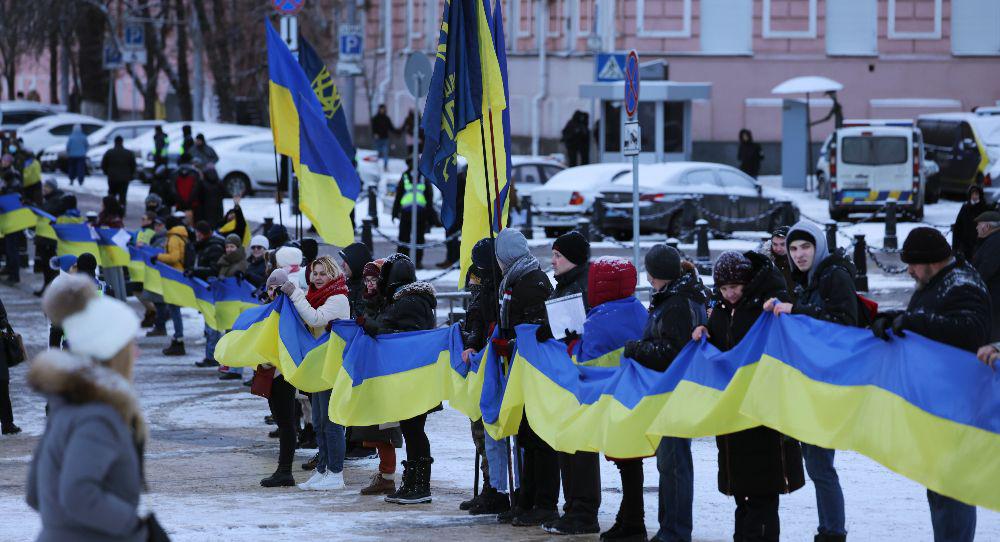They don’t like to admit it. But there is an unnecessary rivalry between NATO and the European Union. NATO is a military, defensive organization. The EU is an economic and political one with vast resources to make a difference to its own members and to its neighbors. Both organizations can complement each other, with NATO focusing on military operations and the EU on civilian missions. They don’t.
The crises in Europe’s eastern neighborhood, the latest being Russia’s military intimidation of Ukraine to the extent where Moscow is threatening its sovereignty and independence, are testing NATO and the EU. The outcome will affect Europe’s ability to act strategically and further integrate. The omens don’t look good for either.
NATO has had its fair share of differences among its European members. Recall how the U.S. invasion of Iraq in 2003 almost destroyed NATO. Then, France and Germany lined up with Russia to oppose the attack. Moscow nearly succeeded in achieving its long-term goal of splitting the transatlantic alliance. NATO’s military intervention in Libya in 2011 and its recent withdrawal from Afghanistan left the alliance bruised and demoralized.
But since Russia began threatening to invade Ukraine again, NATO has shown some spunk. It is sending troops to the Baltic states and Romania. Even though Ukraine or Georgia are not going to join the alliance any day soon, NATO Secretary General Jens Stoltenberg refuses to cede to Russia’s demand to rule out accession.
NATO’s metal would be really tested if the alliance offered Ukraine the Membership Action Plan (MAP). That would set the country on a trajectory toward NATO but also lead to an unpredictable reaction by Russia. Remember how NATO opened the door to Montenegro that was nowhere near fit to join the alliance and was threatened by Russia if it did. Nothing happened.
That aside, on Ukraine NATO is holding the line. This is despite Germany’s attempts to stop some of its members from sending weapons to Kiev. More telling, and this is the big difference between NATO and the EU, most of the alliance’s Western and Eastern European members are now beginning to share a common threat perception.
That is not the case in the EU.
When it comes to Ukraine, apart from the near absence of any leadership from the European Commission, the European External Action Service, and the European Council, the bloc is rife with divisions.
It’s not only that the member states have struggled to agree on additional sanctions on Russia. The two most important countries, France and Germany, don’t seem to take the views of the Baltic states and the Central Europeans seriously, unlike NATO. It’s as if Central Europe and the Baltics have upset the comfort zone that characterized the EU before that big bang enlargement of 2004. The crisis in Ukraine has accentuated these differences.
The Central Europeans and the Baltic states can take some of the blame. Leaving aside the degradation of the rule of law in Poland and Hungary, the region’s influence inside the union would have benefited from forging alliances with the older member states.
Poland did that with Sweden when center-right party Civic Platform was in power in Warsaw in 2007–15. It led to the EU establishing a new policy for its Eastern neighborhood. Since 2015, when Law and Justice came to power, Poland hasn’t made full use of its size, geography, and history to shape an EU policy toward Ukraine and Russia.
This is the greatest weakness of the EU: its lack of any strategic policy toward its eastern neighbors on the one hand and toward Russia on the other. The crisis unfolding in Ukraine confirms these intellectual, political, and strategic deficits.
It would make a big difference if Germany took the lead in moving the EU out of this trough. That seems unlikely. The government in Berlin is divided over how to deal with Russia. A wing in Chancellor Olaf Scholz’s Social Democratic Party is wedded to an Ostpolitik. The supporters of this Cold War policy believe strengthening political, trade, and economic ties with Moscow would bring Russia closer to the West. Instead, it has made Germany’s political elites and economic lobbies more dependent on Russia.
This dependency, exemplified by the controversial Nord Stream 2 pipeline, has deepened the suspicions among the EU’s Nordic, Baltic, and Central Europeans about Germany’s ambivalence toward Russia and how its position toward Ukraine is seen through the prism of Russia. Indeed, because of these views, it’s hard to see the EU becoming more politically integrated. Distrust of Berlin runs deep.
France’s position too has rattled some EU governments. French President Emmanuel Macron’s calls for a Europe to build up its own strategic and defense capabilities are not about making the bloc independent of NATO or the United States. They are about preparing Europe to deal with the changing geopolitical landscape and power shifts, dominated by China and Russia. Their policies can undermine Western democracies and the stability of the EU if the Europeans do not recognize the nature of the threats posed by Beijing and Moscow. Ukraine should be forcing a major rethink in European capitals.










